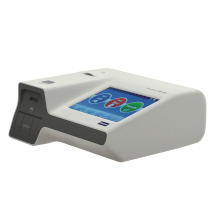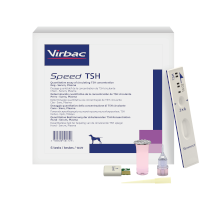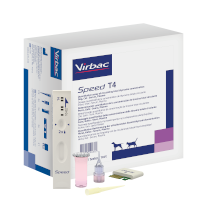
Immunofluorescence
Speed TSH
Measurement of circulating Thyreo Stimulating Hormone (TSH) in dogs.
Speed TSH delivers precise quantitative results directly to the patient bedside in just 15 minutes.

-
Speed TSH offers the veterinary surgeon to increase the diagnostic power of canine hypothyroidism in combination with Speed T4.
-
Thanks to immunofluorescence technology, Speed TSH allows precise, fully quantitative dosing validated with a reference method on a laboratory analyzer.
-
Speed TSH can be used to detect and monitor disease progression and treatment efficacy during a single visit.
For veterinary use only.
Tehnical specifications
| Sample type | 200µL of serum or heparinate plasma |
|---|---|
| Target species | Dogs |
| Manipulation time | 2 minutes |
| Incubation | / |
| Time to results | 12 minutes |
| Operating range | 0.1 - 2.0 ng/mL |
| Storage | Shelf life of 16 months stored at the refrigerator (+2°C à +8°C) |
| Presentation | Box of 6 tests |
Why measure TSH ?
Hypothyroidism is one of the most common hormonal disorders in dogs, particularly in dogs over 6 years of age1.
Hypothyroidism is caused by an irreversible reduction in the function of the thyroid gland, generally of inflammatory or autoimmune origin, slowly leading to a drop in the secretion of thyroid hormones. These hormones are responsible for regulating metabolism. The result is a drop in thyroxine (T4) concentration and an increase in TSH (ThyreoStimulating Hormone) produced by the pituitary gland.
A decreased concentration of T4 associated with an increase in TSH is generally indicative of a hormonal imbalance compatible with hypothyroidism.
However, it is important to note that :
- A certain number of dogs suffering from hypothyroidism have total T4 concentrations that remain within the usual values due to partial functioning of the thyroid gland. Therefore, the diagnosis of canine hypothyroidism should not be made on the basis of T4 levels alone.
- Similarly, a diagnosis of hypothyroidism should not be based on TSH levels alone, as 20 to 40% of dogs have TSH levels within the reference range for various reasons (secondary hypothyroidism, pulsatile secretion, etc)2.
- Some dogs have normal or reduced T4 levels caused by other non-thyroid diseases (euthyroid dogs), leading to over-diagnosis of hypothyroidism.
The canine TSH assay provides an important additional level of information on thyroid function and increases overall diagnostic specificity.
When to measure TSH ?
Hypothyroidism is a common endocrine disorder that can affect any dog. On average, dogs are diagnosed at 6 years of age, but certain breeds at risk (Doberman, Pinscher, Golden Retriever, etc.) can present symptoms as early as 2 years of age.
Symptoms of hypothyroidism are linked to a slowdown in the general metabolism, are not very specific and progress rather slowly. They include skin disorders, weight gain despite reduced appetite, increased fatigue, intolerance to cold, muscle stiffness, etc.
The disease can sometimes be difficult to diagnose, and requires a full biochemical and thyroid work-up:
Speed TSH should be measured in addition to Speed T4 in any dog suspected of having hypothyroidism, as part of the diagnosis and monitoring of treatment.
In dogs, the T4 assay alone is generally not sufficient to make a diagnosis of hypothyroidism and must be confirmed by a TSH assay which can be performed with Speed TSH.
Quick guide
Sortir les tests, réactifs et échantillons du réfrigérateur 30 minutes avant l'analyse afin que le matériel de test soit à température ambiante.
Start a ‘new test’ on Speed Reader or from Speed Connect and follow the instructions on the screen.
For further details, please refer to the instructions for use included with Speed TSH kits.
Recommandations
- Do not use EDTA or whole blood for the sample.
- The serum or plasma must be used at room temperature within one hour, and can be stored separated from the red blood cell pellet in a dry tube in the refrigerator for 7 days. After this period, the sample should be frozen at -20°C.
- Cool or freeze samples at room temperature before use (do not heat).
- Strictly follow the steps in the protocol and the incubation time.
- Follow the pipetting method indicated in the test instructions for use.
- Never mix reagents, test cassettes and calibration chips from one batch to another.
Performances of Speed TSH
Validation du test Speed TSH versus méthode immuno-enzymatique par chemiluminescence sur des échantillons de plasma/sérum :
| Chiens (N=104) | |
|---|---|
| Régression linéaire | y=1,01x + 0,07 |
| Corrélation | R2=0,95 |
Speed TSH a une excellente corrélation avec le dosage de référence immuno-enzymatique par chemiluminescence chez le chat et le chien.
Bibliography
1. Feldman EC, Nelson RW, Reusch C and Scott-Moncrieff JC. Canine and Feline Endocrinology.4th Édition, 2015. Saunders Elsevier, St Louis, Missouri. ISBN: 978-1-4557 4456-5.
2. Ferguson DC. Testing for Hypothyroidism in dogs. Vet Clin N Am Small Animal
Pract 2007;37:647-669
3. Melian C. Diagnosing Canine Hypothyroidism and the Euthyroid Sick Syndrome. Proceedings of 27th WSAVA Congress. Granada, Spain, 2002
4. O’Neill SH, Frank LA, Reynolds LM. Effect of an anti-infl ammatory dose of prednisone on thyroid hor-
mone monitoring in hypothyroid dogs. Vet Dermatol 2011;22(2):202-205
5. Koistra HS. Secretion pattern of thyroid-stimulating hormone in dogs during euthyroidism and hypothyroidism. Domest Anim Endocrinol. 2000 Jan;18(1):19-29
Related products



